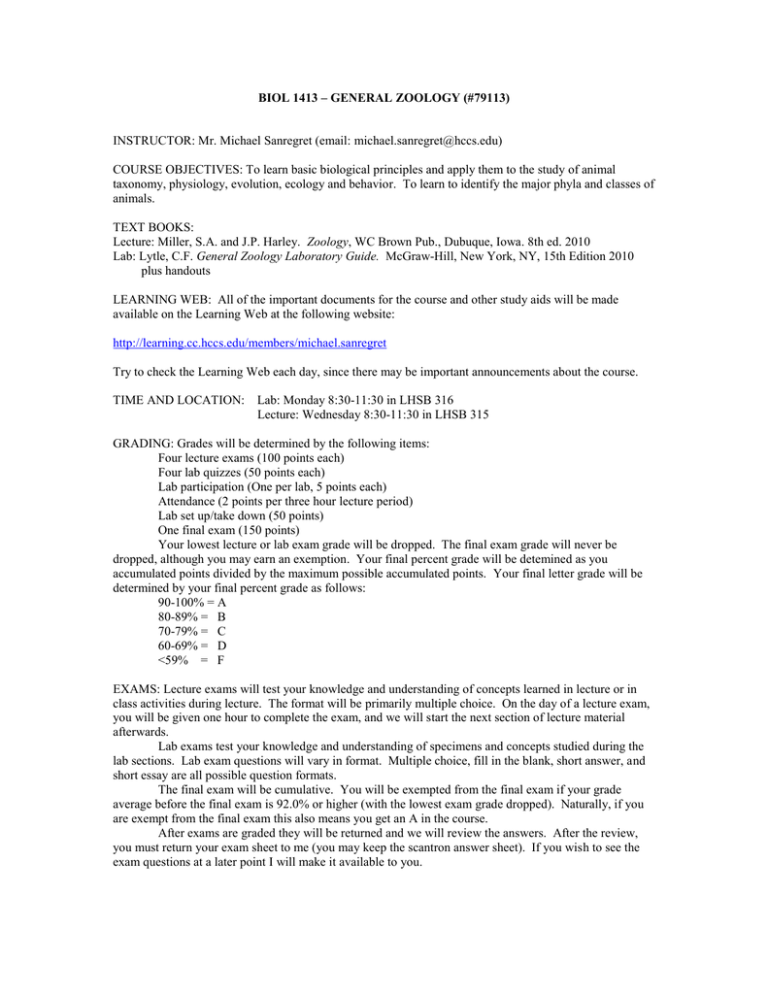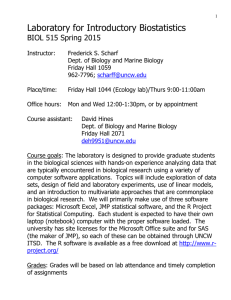BIOL 1413 Sanregret syllabus central campus spring 2011.doc
advertisement

BIOL 1413 – GENERAL ZOOLOGY (#79113) INSTRUCTOR: Mr. Michael Sanregret (email: michael.sanregret@hccs.edu) COURSE OBJECTIVES: To learn basic biological principles and apply them to the study of animal taxonomy, physiology, evolution, ecology and behavior. To learn to identify the major phyla and classes of animals. TEXT BOOKS: Lecture: Miller, S.A. and J.P. Harley. Zoology, WC Brown Pub., Dubuque, Iowa. 8th ed. 2010 Lab: Lytle, C.F. General Zoology Laboratory Guide. McGraw-Hill, New York, NY, 15th Edition 2010 plus handouts LEARNING WEB: All of the important documents for the course and other study aids will be made available on the Learning Web at the following website: http://learning.cc.hccs.edu/members/michael.sanregret Try to check the Learning Web each day, since there may be important announcements about the course. TIME AND LOCATION: Lab: Monday 8:30-11:30 in LHSB 316 Lecture: Wednesday 8:30-11:30 in LHSB 315 GRADING: Grades will be determined by the following items: Four lecture exams (100 points each) Four lab quizzes (50 points each) Lab participation (One per lab, 5 points each) Attendance (2 points per three hour lecture period) Lab set up/take down (50 points) One final exam (150 points) Your lowest lecture or lab exam grade will be dropped. The final exam grade will never be dropped, although you may earn an exemption. Your final percent grade will be detemined as you accumulated points divided by the maximum possible accumulated points. Your final letter grade will be determined by your final percent grade as follows: 90-100% = A 80-89% = B 70-79% = C 60-69% = D <59% = F EXAMS: Lecture exams will test your knowledge and understanding of concepts learned in lecture or in class activities during lecture. The format will be primarily multiple choice. On the day of a lecture exam, you will be given one hour to complete the exam, and we will start the next section of lecture material afterwards. Lab exams test your knowledge and understanding of specimens and concepts studied during the lab sections. Lab exam questions will vary in format. Multiple choice, fill in the blank, short answer, and short essay are all possible question formats. The final exam will be cumulative. You will be exempted from the final exam if your grade average before the final exam is 92.0% or higher (with the lowest exam grade dropped). Naturally, if you are exempt from the final exam this also means you get an A in the course. After exams are graded they will be returned and we will review the answers. After the review, you must return your exam sheet to me (you may keep the scantron answer sheet). If you wish to see the exam questions at a later point I will make it available to you. LAB SET UP/TAKE DOWN ASSIGNMENT: Starting with the lab on Feb. 14, a group of three students will assist in setting up specimens for each lab session. I will provide a sign-up sheet where each student can sign-up for one lab period (up to three students per session). You should consult with me in the week prior to your scheduled set up day to discuss what work will need to be done. One major task in lab set up will be to update the Biology Department’s Lab Study pages for General Zoology. This will be discussed in further detail in the future. ATTENDANCE and WITHDRAWALS: As noted in the grading section, you will be graded on attendance. Make note, however, that I usually do not automatically drop students from the roster for lack of attendance. If you intend to drop the class, you must either arrange for a withdrawal on your own through the registrar, or you must let me know in writing (preferably via email) that you wish to drop the class by the last day for student withdrawals (Apr. 14, 2011). These are the only way to be sure that you will receive a “W” grade at the end of the semester. If you do not arrange for withdrawal by Apr. 14, you will receive a letter grade ranging from a possible “A” to a possible “F” at the end of the semester, depending on your grade average. If you stop attending class entirely from Nov. 8 on, I will give you a W grade for the semester. Also be aware that a new policy at Texas public colleges and universities requires students who repeat a course for a third time or more will be charged an additional $50/credit hour. ASSISTANCE: If you have questions about the course material, I encourage you to ask me questions during or outside of class, or over email (michael.sanregret@hccs.edu). We may also schedule a time to meet to discuss course material. Tutoring is available (times and locations TBA). Exchange phone numbers with some of your classmates because you may want to form study groups or need to find out about missed classes or assignment. ADDITIONAL STUDY MATERIALS: The Biology/Nutrition has developed lab study pages that may be helpful when reviewing your lab material. The URL is: http://ccollege.hccs.edu/instru/Biology/AllStudyPages/StudyPages/1413.htm APPEALING GRADES: If you believe that your work has been graded incorrectly, you must contact me within a week (not counting holidays) after the grade is given to discuss the grade. Exceptions may be made for illness or other valid excuses. Difficulties that cannot be resolved through me should be brought to the Biology Chair, Pramila Sen in LHSB 402. RULES AND REGULATIONS 1. Textbook and lab manual are required. 2. Full Class attendance is required. Students with more than four unexcused absences may result in an administrative withdrawal. Students are responsible for everything covered during their absence, and it is the student’s responsibility to consult with the instructor for make-up assignments. 3. To avoid disruption in the classroom, all pagers must be set on the silent mode. Cellular phones must also be turned off during the class period. 4. No children are allowed in the laboratory. 5. Eating, drinking, or smoking is NOT allowed in the laboratory. 6. You must read the laboratory safety rules before doing any of the lab exercises. 7. The laboratory safety release form must be signed during the first lab session. 8. Lab reports are an important part of the course and to be completed one week after the lab period. They will be spot-checked during the lab period. Although students work in groups, individual active participation is expected. You are responsible for the completion of your individual lab report. 9. *Dissection of preserved animals is required in this course. 10. CHEATING IS NOT PERMITTED!!! If it occurs the student may receive a zero for the exam or a grade of “F” in the course. 11. Grades will not be posted at any time during the semester. Your grade will be available on the web (www.getgrades.com) or by telephone (1-877-341-4300) 12. Students who require reasonable accommodations for disabilities are encouraged to report to Room 106 LHSB, or call (713) 718-6164 to make necessary arrangements. Faculty are only authorized to provide accommodations requested by the Disability Support Services Office 16. Open labs will be scheduled during the semester for review of lab materials. The schedule will be available in your classroom during the semester 17. The Biology Computer lab is in Room LHSB 415, computers and biology software are available for student use. Biology tutoring will also be available in the lab. The scheduled will be posted in the classroom. *You may be excused from dissection if you have a letter from your doctor declaring that you are unable to handle dissection specimens. I strongly suggest that if you are pregnant, you seek the advice of your physician before participating in this class. TENTATIVE SCHEDULE: Week Date 1 Jan. 19 2 Jan. 24 Jan. 26 3 Jan. 31 Feb. 2 4 Feb. 7 Feb. 9 5 Feb. 14 Feb. 16 6 Feb. 23 7 Feb. 28 Mar. 2 8 Mar. 7 Mar. 9 9 Mar. 21 Mar. 23 10 Mar. 28 Mar. 30 11 Apr. 4 Apr. 6 12 Apr. 11 Apr. 13 13 Apr. 18 Apr. 20 14 Apr. 25 Apr. 27 15 May 2 May 4 Finals May 9-15 Topic Introduction; Cells Lab: Microscopy and Cells and Tissues Evolution Lab: Mitosis and Meiosis, Development Ecology Lab Quiz 1; Lab: Protozoa Intro to Animal Diversity Lab: Porifora, Cnidaria Lecture Exam 1; Mollusca, Annelida Arthropoda; Echinodermata Lab: Platyhelminthes and Pseudocoelomates Intro to Chordates Lab quiz 2 Lecture Exam 2; Amphibians Lab: Mollusca, Annelida Reptiles, Birds Lab: Arthropoda, Echinodermata Mammals; Protection, Support, Movement Lab: Chordata: inverts and fish Communication; Circulation and Gas Exchange Lab quiz 3; Lab: Chordata, amphibians Lecture Exam 3; Nutrition Lab: Chordata, reptiles Thermoregulation and Osmoregulation Lab: Birds, Mammals Reproduction and Development Lab quiz 4 Lecture Exam 4; Review for final Final exam (time TBA) Chapter 1-3 Text Lab 1, 2 4,5 Text Lab 3, 4 6 Text Lab 5 7-11 Text Lab 7, 8 12, 13 Text 14-16 Text Lab 8-10 17-18 Text 19 Text Lab 11-12 20-21Text Lab 13-14 22, 23 Text Lab 15-17 24-26 Text Lab 18 27 Text 28 Text Lab 19, 20 29 Text





